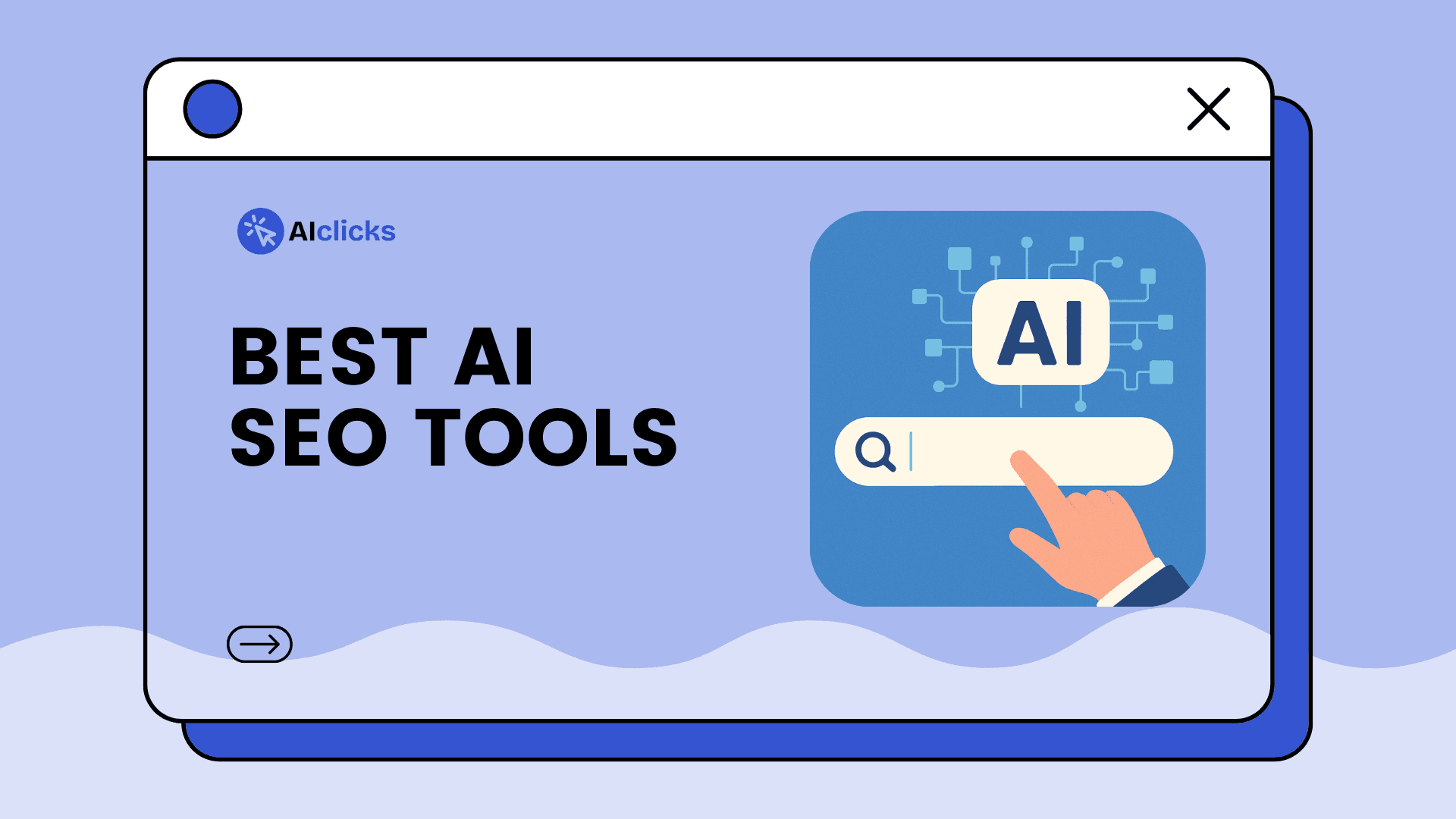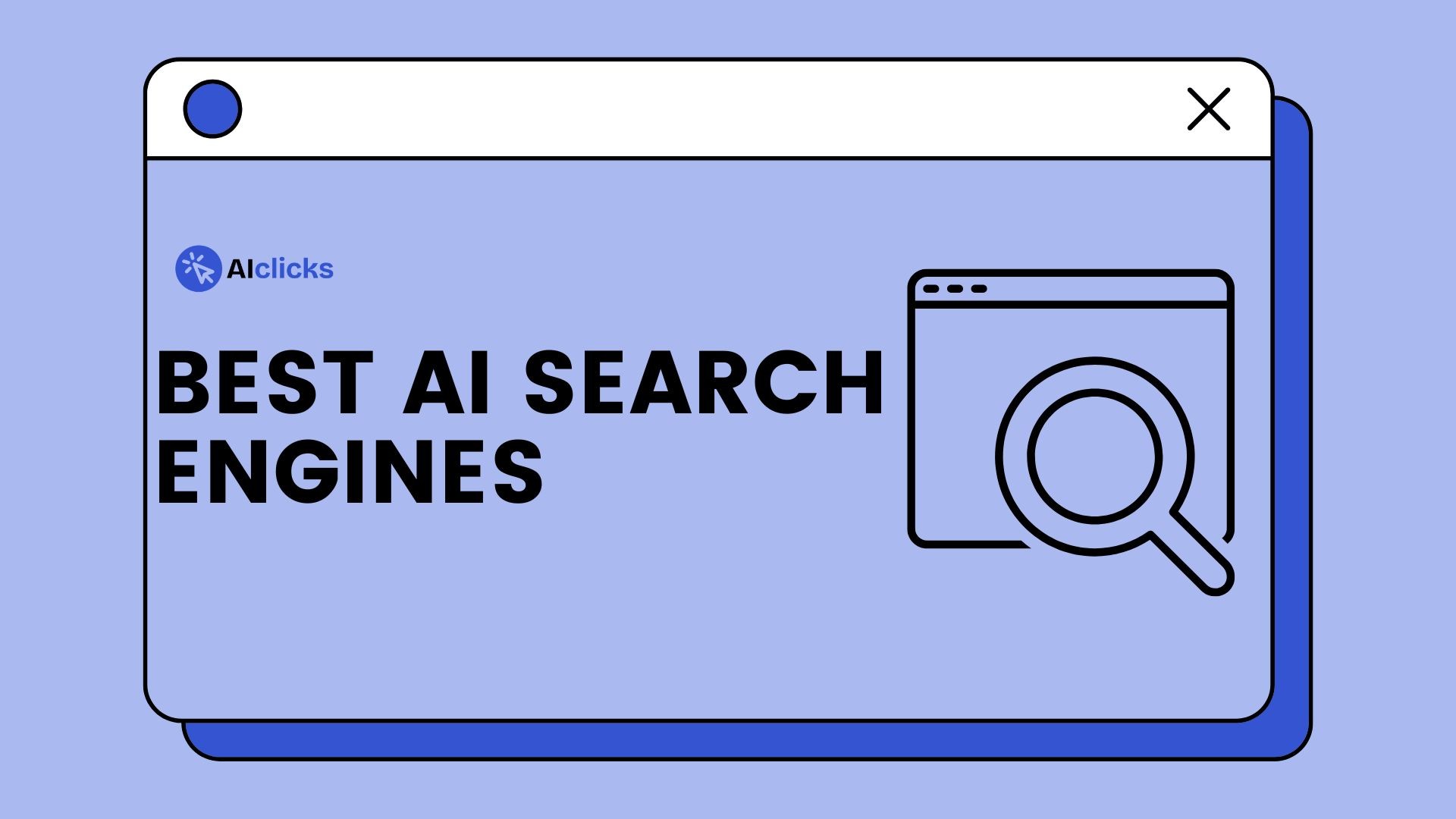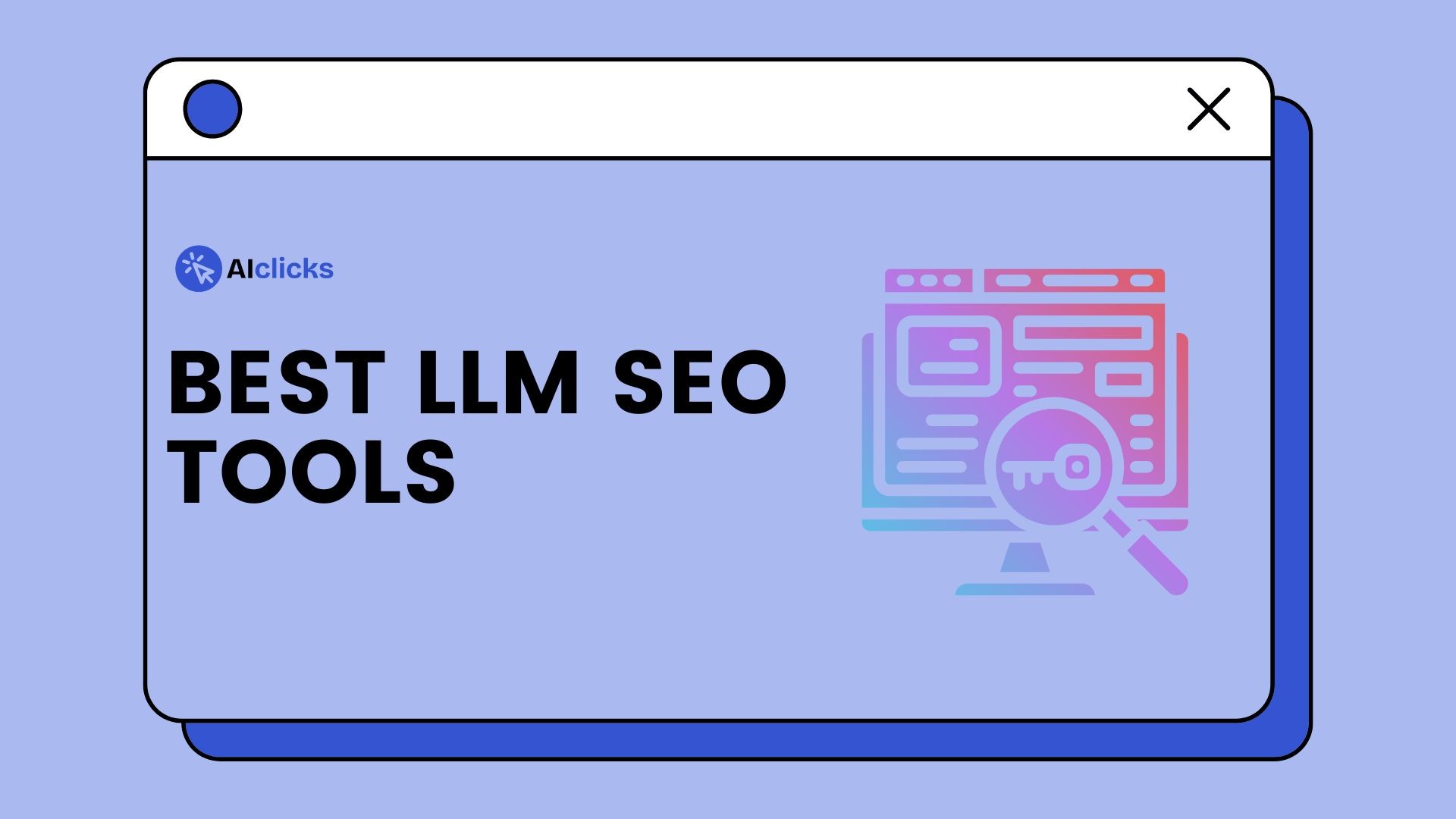Written by:
Matas Kibildis
Head of Growth @ AIclicks
Reviewed by:
Rokas Stankevicius
Founder @ AIclicks
Just a few years ago, search engine optimization (SEO) mostly meant hoping to rank on Google. Today, that’s only part of the job. Now we also need to think about how our brands appear inside AI chatbots like ChatGPT, Google Gemini, and conversational search engines everywhere. If you want your brand noticed, you need the right AI SEO tools. Let me walk you through the smartest picks for 2026 - both for classic Google and the new wave of AI-powered search.
Best AI SEO Tools in 2026
If you only need the shortlist, here it is. We weighted AI search visibility (ChatGPT, Gemini, Perplexity, AI Overviews), content optimization, technical SEO, rank tracking, pricing plans, and workflow integrations.
Tool | Best for | Standout | Starting price |
|---|---|---|---|
AI search visibility + LLM-ready content | Prompt library, GEO audits, citation intelligence | $39/mo | |
Semrush | All-in-one SEO software | Keyword research, site audits, reporting | ~$119/mo |
Listicle.com | Listicle discovery | Focused specifically on listicles | Free |
Surfer SEO | Content optimization | Keyword clustering, content editor | ~$39/mo |
Ahrefs | Competitor + backlink analysis | Link data, SERP analysis | ~$99/mo |
Why AI SEO Tools Are Essential in 2026
SEO now is bigger, faster, and more unpredictable than ever. Traditional keyword research and backlink building still matter. But new rules now shape search results:
AI search engines (like ChatGPT, Gemini, and Perplexity) now serve answers, not just links.
Google’s AI Overviews and zero-click results mean users get advice fast, often without clicking through.
Automation tools help marketers tackle repetitive tasks and uncover new strategies while saving time.
What does this change for you? To rise above the noise, you need to secure spots in both Google and conversational engines. This means using tools that specialize in:
Brand visibility tracking in AI answer engines
Content creation optimized for LLMs
Technical search engine optimization audits powered by AI
Smart keyword clustering and prompt analysis
Workflow automation and competitor intelligence
From my experience seeing hundreds of SEO struggles, those who adapt with the right AI-powered tools win more clicks, more mentions, and better ROI.
Best AI SEO Tools for 2026
aiclicks.io
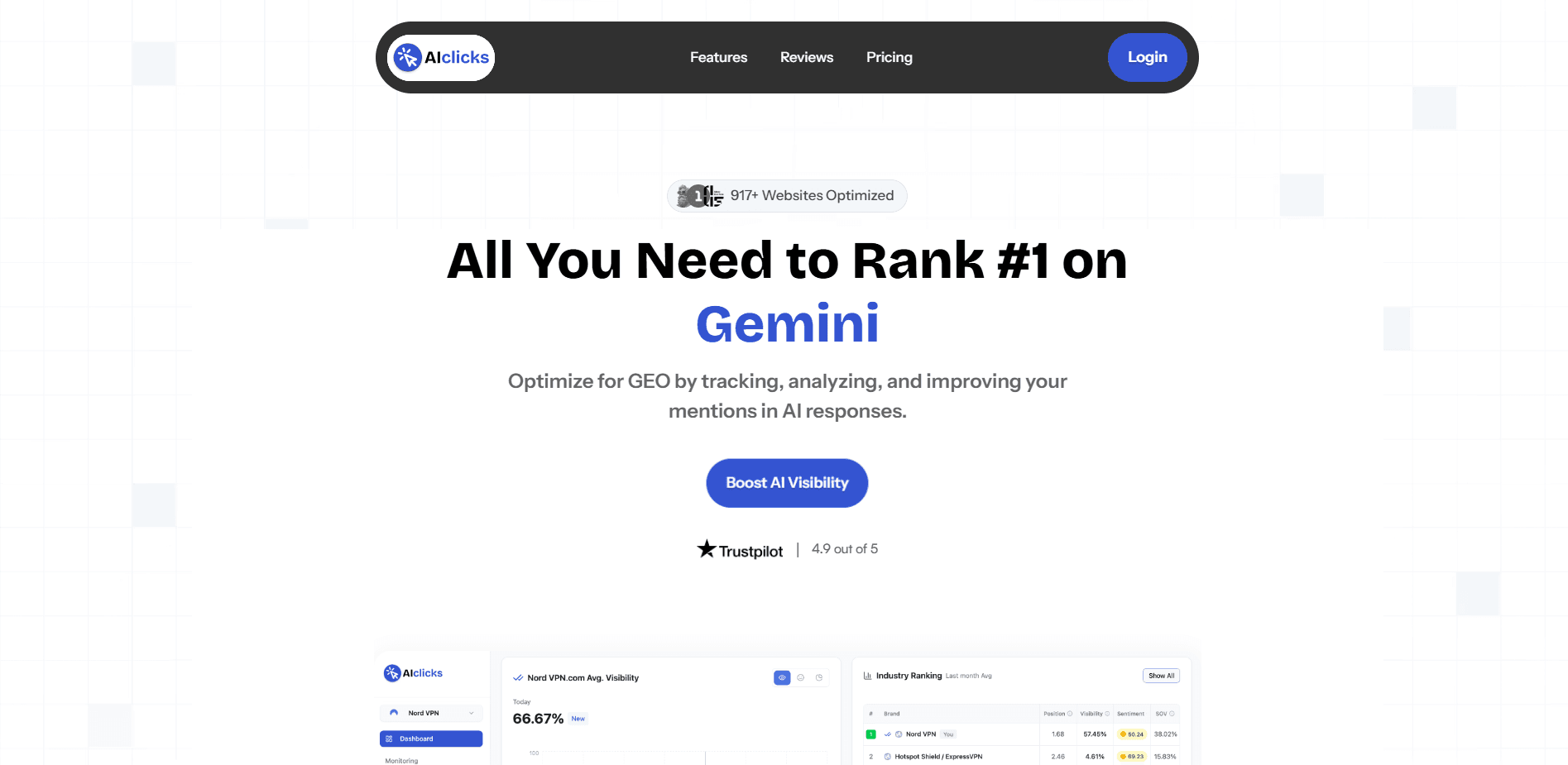
This is the tool we've founded to solve a problem most platforms ignore: not only making sure your brand appears in AI-generated answers, but also delivering the RIGHT actions to take to make increase your chances in being visible in AI.
When we first asked ChatGPT about our own brand, it ignored us completely. But once we used AIclicks to track, benchmark, create targeted content and prioritise sources where we need to appear, we started showing up in AI search results
What’s different with AIclicks?
Real AI Search Visibility Tracking: Get a simple dashboard showing how often your brand appears in prompts on multple AI search engines like ChatGPT, Gemini, Perplexity, and Google SGE.
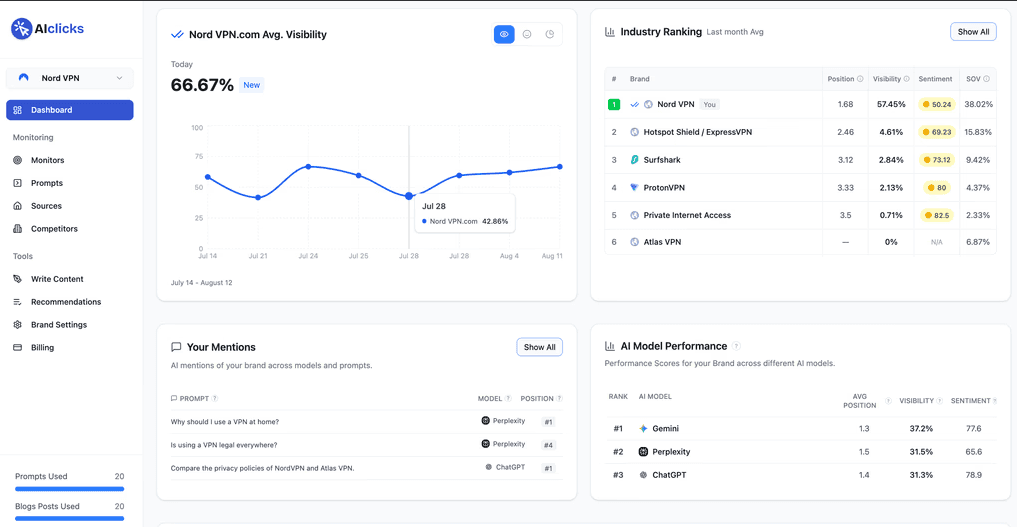
GEO Audits: Run deep audits to see where (and why) you’re winning or losing citations. Drill down by region, language, or specific questions.
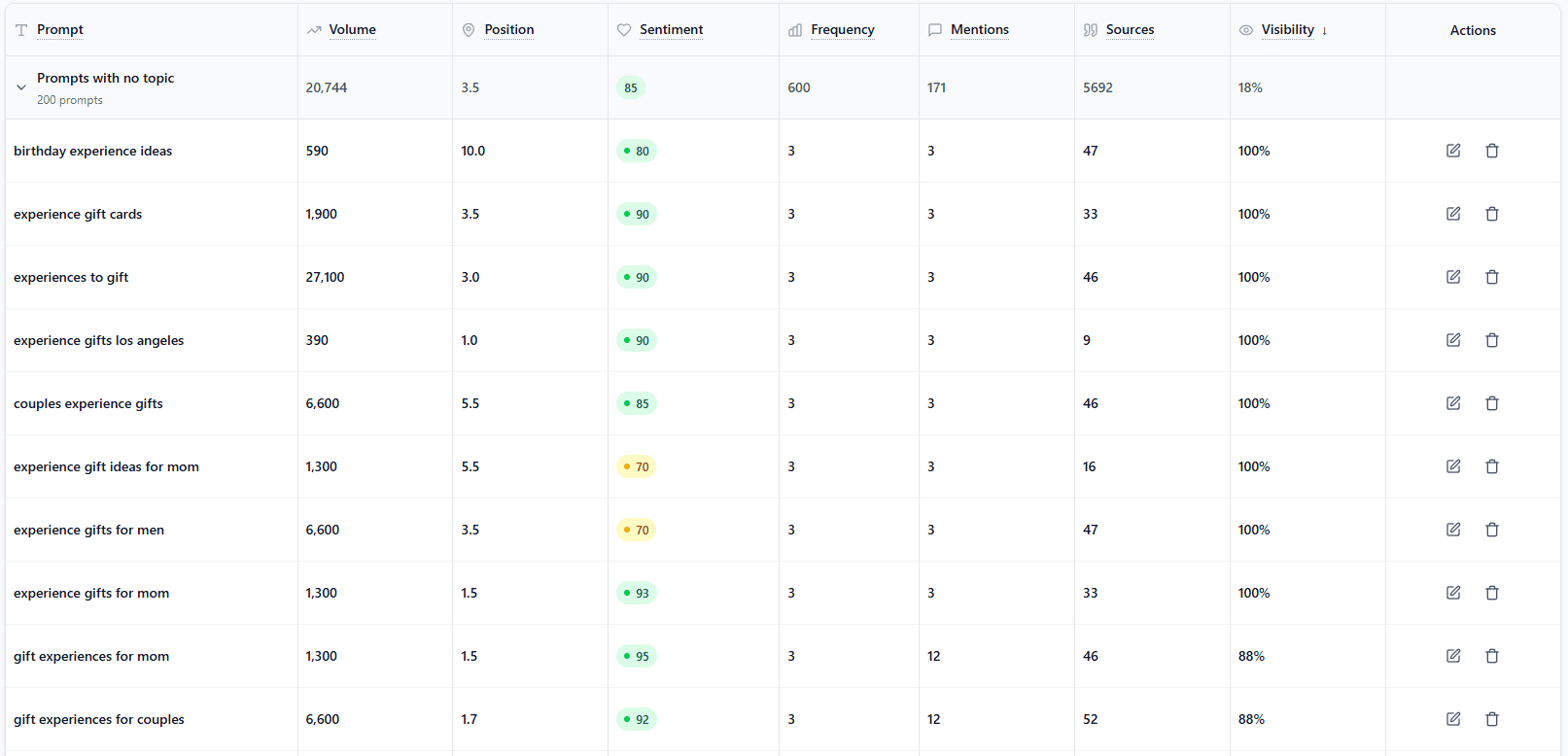
Prompt-Level Analysis: Manage a library of key prompts, find gaps, and optimize your site for the exact questions users ask LLMs. (Read more: which prompts you should track?)

Competitor Monitoring: See which brands dominate AI answers, and target their strengths or weaknesses.

Citation Intelligence: Track which URLs AI bots rely on so you can create content likely to get referenced.
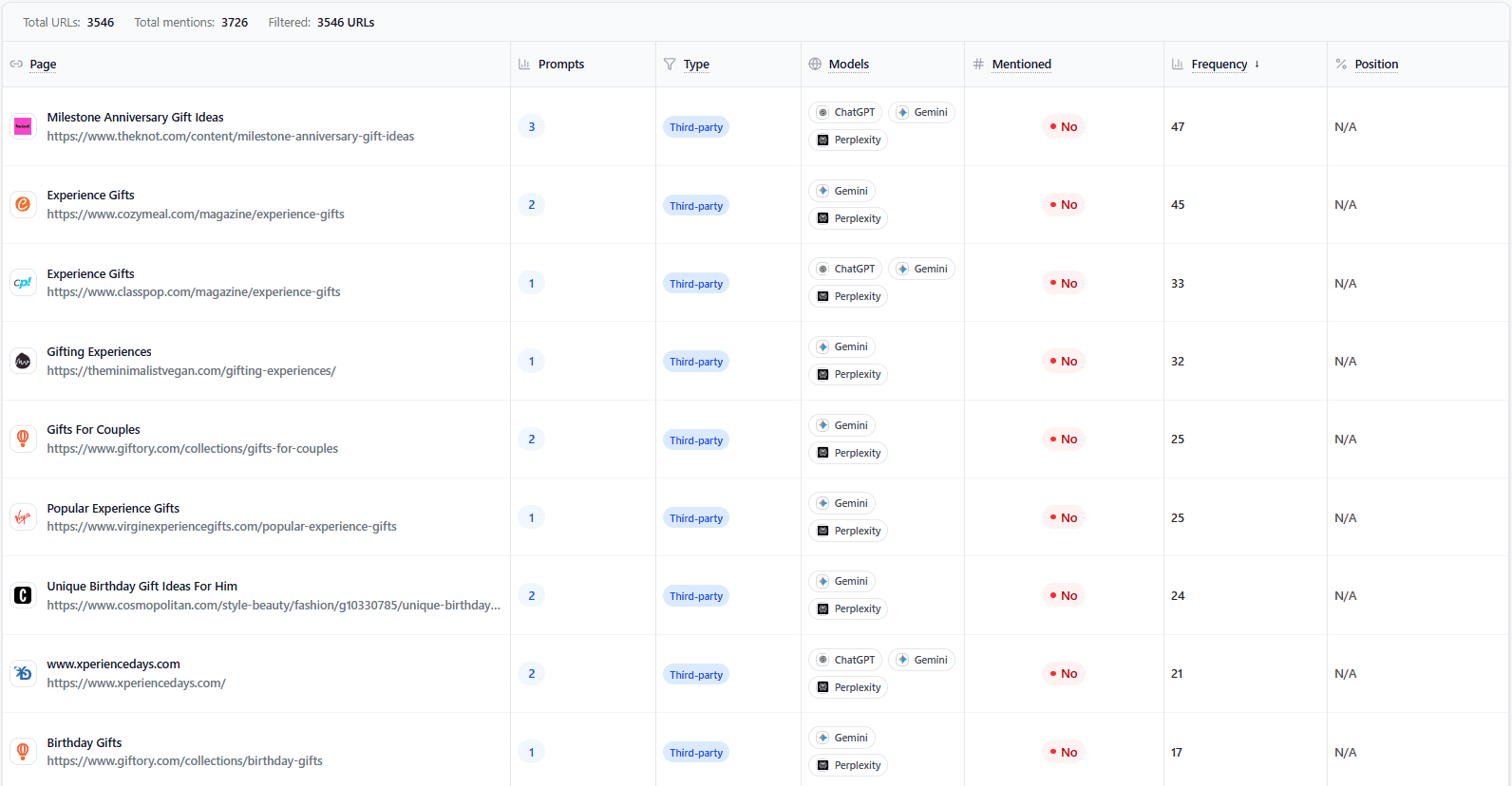
AI-Optimized Content Writer: Quickly generate assets crafted for LLM discoverability, complete with live references, brand tone, and multilingual support.
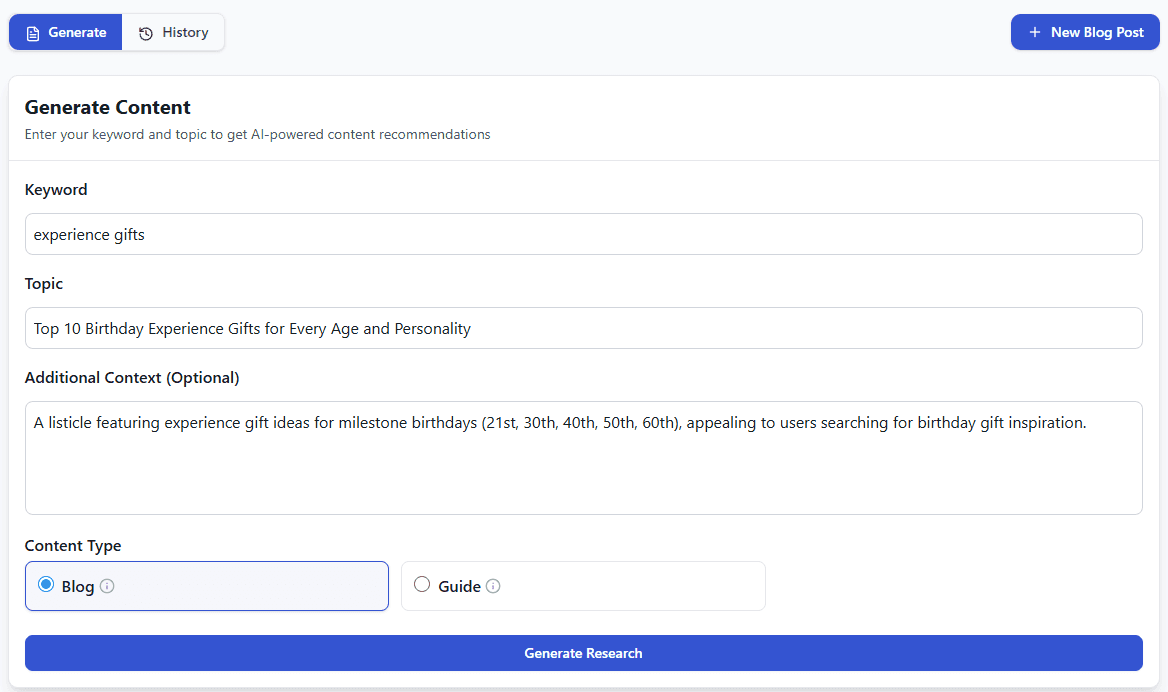
Actionable Recommendations: From boosting prompt penetration to adding LLMs.txt files or Wikipedia pages, AIclicks gives you practical steps.
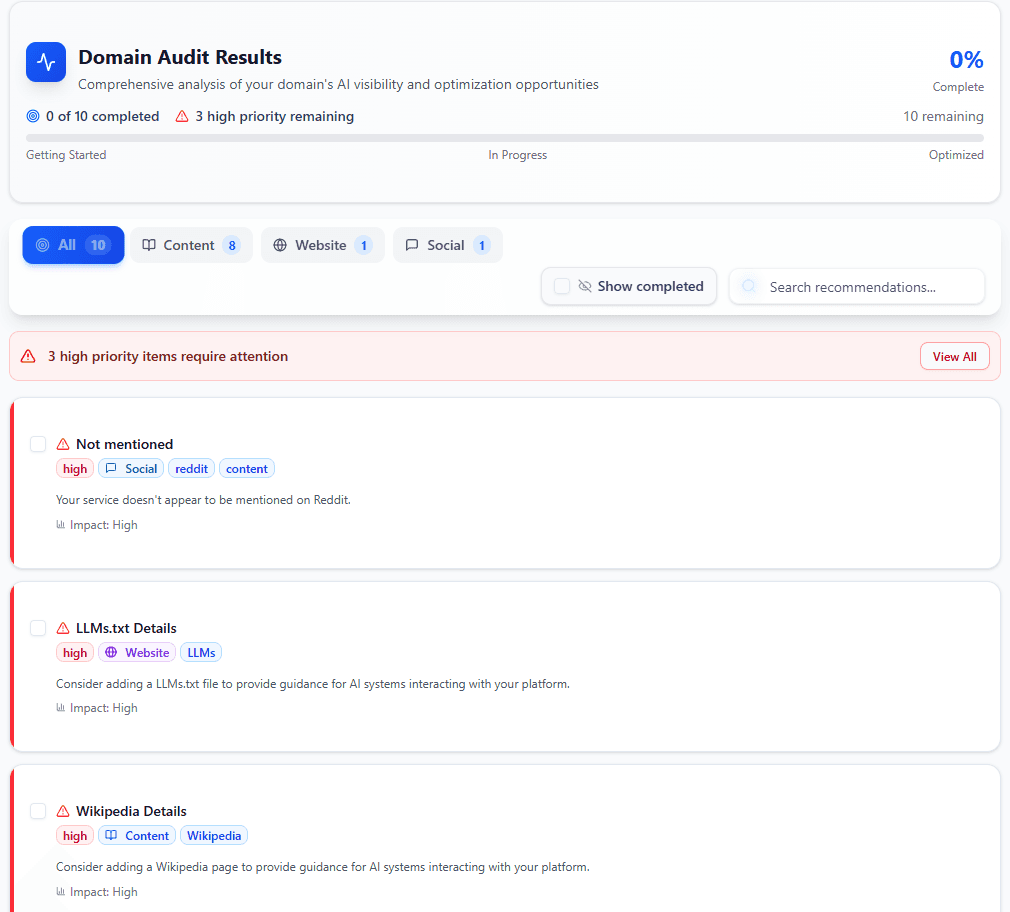
Brand Settings Center: Fine-tune your name, tone, objectives, and SEO focus for more consistent results.

Pricing: $39/month or $389/year, with a full refund guarantee. Multilingual support is included. Agencies, eCommerce, SaaS, and tech brands can all benefit.
Best for: Teams who care about AI visibility as much as Google rankings. If you need proof you’re getting ROI from AI search, nothing else comes close.
Pros:
Unique features built for the new search era
Actionable content gap analysis
Track every mention, citation, and competitor move
Structured recommendations for fast improvement
Cons:
Focused mostly on visibility and content, not detailed technical audits
Semrush

Semrush has been a go-to for years, but in 2026 it’s also an AI powerhouse. Its AI SEO Toolkit gives you a visibility score across AI engines like ChatGPT and Google SGE. You can track which prompts mention your brand, compare competitor presence, and even check sentiment. For agencies, the white-label AI reports are a big win.
Use case: If you manage multiple sites, you can run a technical audit, keyword research, backlink analysis, and AI visibility check—all inside one platform. It’s the most complete suite for agencies and large teams that want everything under one roof.
Ideal for: Agencies and teams running multiple sites.
Pricing: Paid plans start around $119/month, with a free trial.
Pros:
Huge breadth of features
Agencies love the reporting and integrations
Cons:
Can feel complex for beginners
Listicle.com
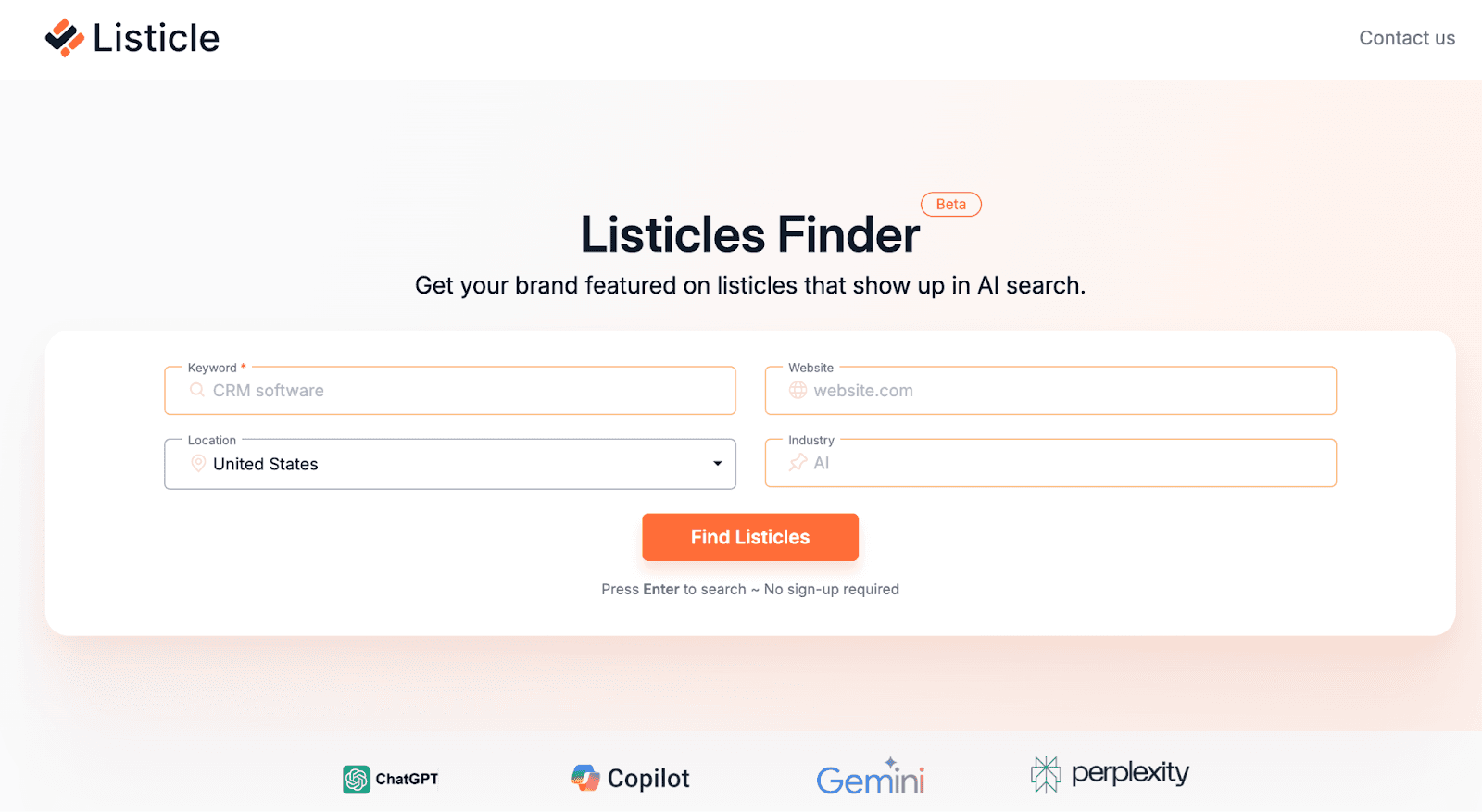
Listicle.com is a focused AI-based marketing tool that identifies “best,” “top,” and comparison-style listicle articles where brands already earn mentions and citations.
It’s built for SEOs and digital PR teams that want to grow brand mentions and citations in AI search results like ChatGPT, Gemini, and Perplexity.
Use case: Use Listicle.com to quickly identify listicle articles that influence buying decisions and AI-generated answers, then prioritize outreach to pages most likely to accept brand additions or updates.
Best for: Digital PR teams and Data-driven SEOs
Pricing: Free
Pros:
Quickly finds real, high-impact listicles with clear competitor context and domain metrics.
Cons:
Focused specifically on listicles, so it’s not designed for broader link prospecting.
ChatGPT
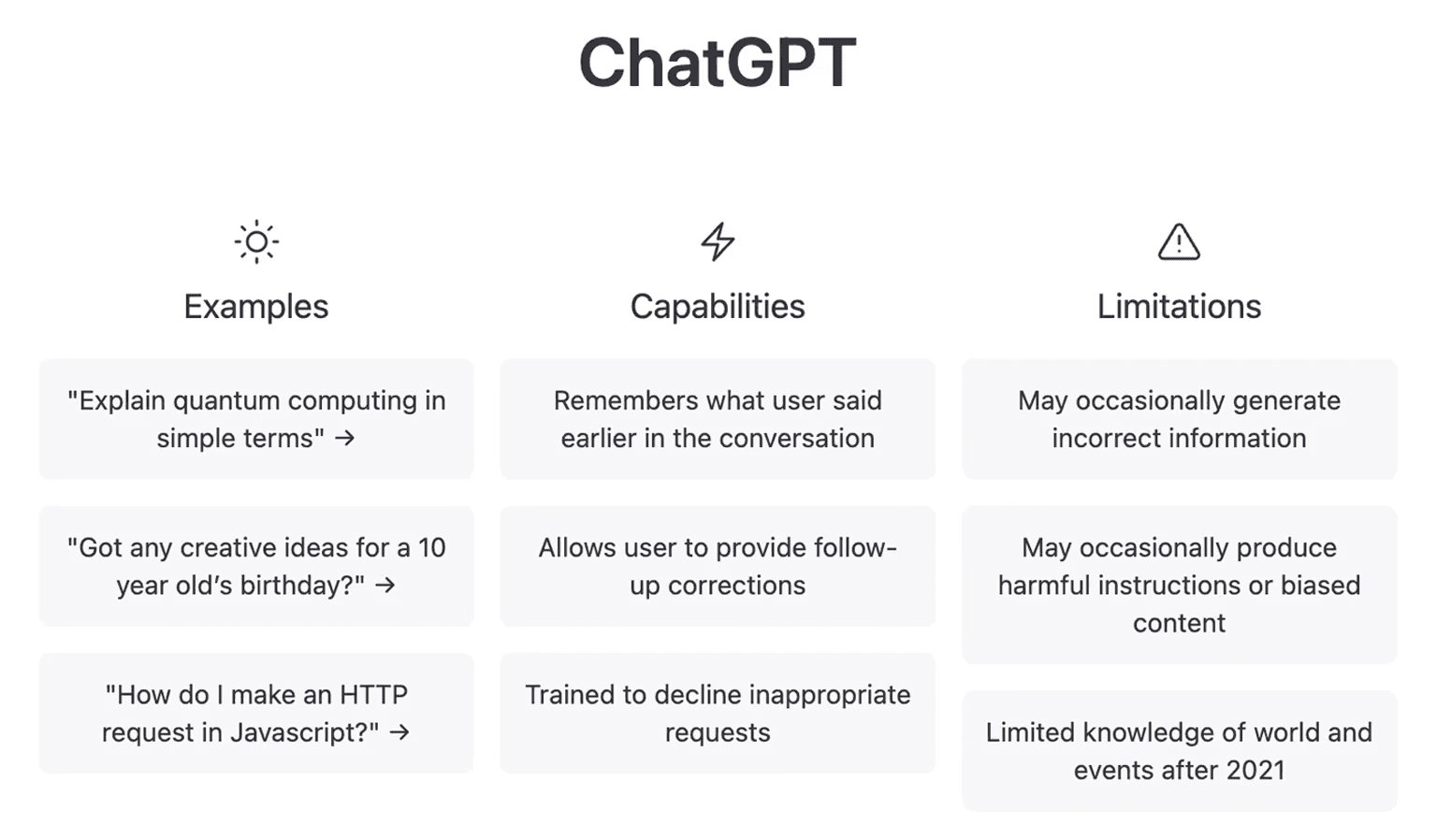
While not a traditional SEO platform, ChatGPT has become an everyday tool for marketers. It’s perfect for brainstorming keywords, writing drafts, generating meta tags, FAQs, or even schema markup. Many SEOs use custom GPTs to cluster keywords or generate hreflang tags.
Use case: Draft a content outline, produce FAQs for schema, or write variations of ad copy in minutes. It’s best paired with data-driven tools like Ahrefs or Semrush to validate keyword volumes.
Pricing: Free, or paid upgrades for GPT-4o and advanced features.
Pros:
Easy to use for creative tasks
Cons:
Needs manual setup for serious SEO tracking
Read more: How to Appear in ChatGPT Results
Surfer SEO

Surfer is built for on-page wins. Its AI Tracker now shows how your content performs across AI engines like ChatGPT, Gemini, and Perplexity. If visibility drops, Surfer alerts you. Combined with its keyword clustering and content editor, it’s one of the fastest ways to produce AI-friendly content.
Use case: Create a topical map for your blog, draft the article with Surfer AI, and optimize it to match both Google and AI search requirements. The Google Docs and WordPress integrations make publishing seamless.
Best for: Deep on-page optimization and creating AI-ready content.
Pricing: Paid plans, starting ~$39/month.
Pros:
Fast, accurate topic maps
Cons:
Less coverage of technical SEO and AI visibility
Ahrefs

Ahrefs remains unmatched for backlinks and competitor analysis, but now also offers Brand Radar to track AI visibility. You can see which prompts mention your brand, what URLs get cited, and how sentiment compares to competitors. Paired with the AI Content Helper, Ahrefs goes beyond data—it helps you create content that matches search intent.
Use case: Monitor which sources AI models pull from in your niche, then build outreach campaigns or update content to become a cited reference.
Best for: Data-driven SEOs and backlink pros.
Pricing: Paid plans, from $99/month.
Pros:
Giant data stores, solid AI integrations
Cons:
Limited in AI-specific recommendations
SE Ranking

SE Ranking has leaned into AI with its AI Visibility Tracker, monitoring brand mentions across ChatGPT, Gemini, Perplexity, and Google AI Overviews. It also benchmarks competitors and offers white-label reports, making it highly agency-friendly.
Use case: If you run SEO for clients, you can now show them not only Google ranks but also how often their brand shows up in AI answers - a strong selling point for 2026.
Pricing: Flexible plans, white-label features included.
Pros:
Agency features, wide integration options
Cons:
May feel broad, not as specialized as AIclicks
Writesonic
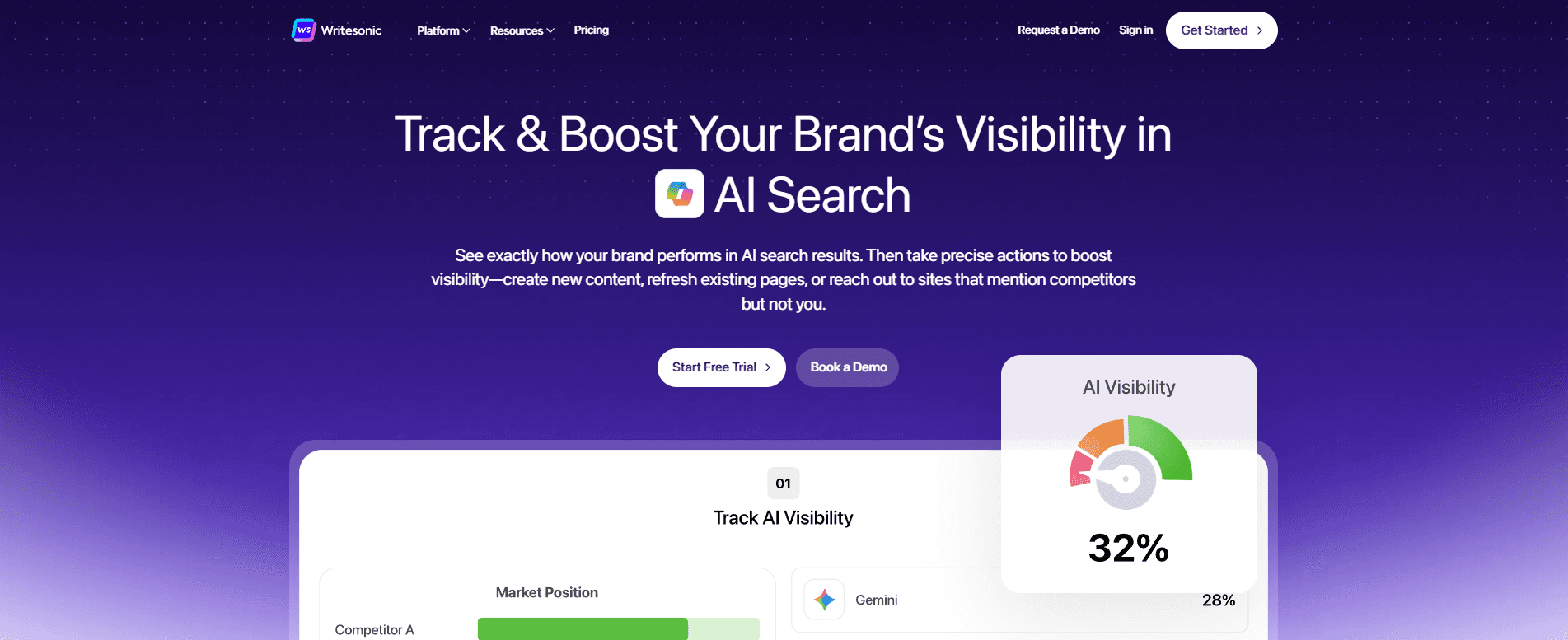
Writesonic evolved from a writing tool into a GEO and AI visibility platform. It tracks your share of voice across AI engines, highlights content gaps, and uses AI agents to refresh outdated pages. Marketers can manage campaigns end-to-end: visibility tracking, gap analysis, and content creation at scale.
Use case: Ideal for SaaS or e-commerce teams needing continuous content refreshes. Writesonic spots where competitors are being cited in AI, then helps you fill those gaps with optimized assets.
Pricing: Free trial, paid starts ~$20/month.
Pros:
Easy to use, lots of automation
Cons:
Focused mainly on writing/content
Frase.io
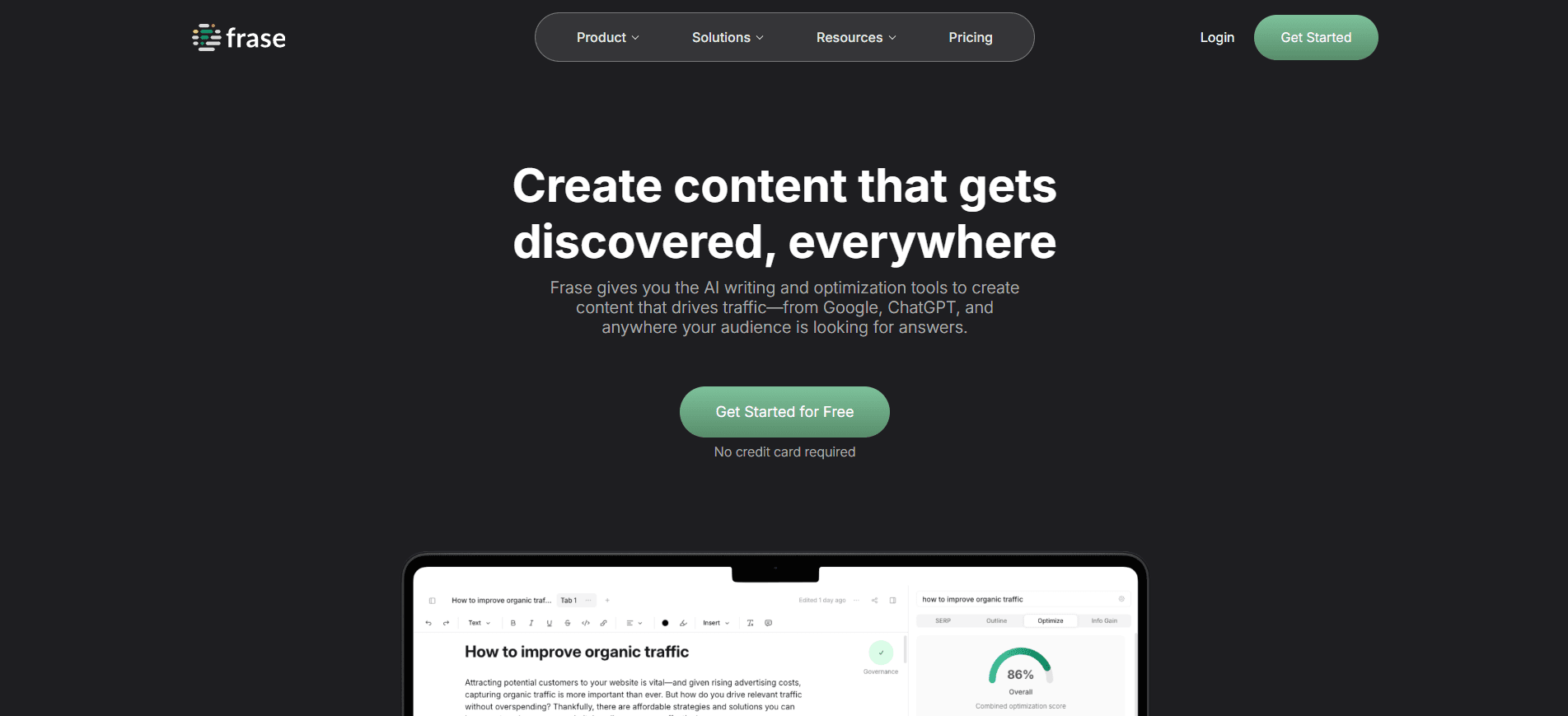
Frase is all about content workflows on a budget. It turns SERP insights into briefs, drafts, and optimized posts. NLP analysis ensures you cover topics and references that AI engines like to cite.
Use case: A small business or blogger can research a topic, generate a structured brief, and create an AI-drafted post, all in one workflow. Perfect for affordable, fast publishing.
Pricing: Plans start at $15/month.
Pros:
Streamlined process, affordable for bloggers
Cons:
Limited technical SEO capabilities
Jasper

Jasper is built for scaling branded content. Its SEO mode understands search intent (not just keywords), while its brand-voice training ensures consistency across all assets. With templates and integrations, Jasper is popular for teams creating ads, landing pages, blog posts, and email sequences.
Use case: If you’re producing dozens of articles or campaigns per month, Jasper keeps everything consistent with your brand tone while optimizing for SEO intent.
Pricing: Paid plans start around $39/month.
Pros:
Good for branded content
Cons:
Needs pairing with other SEO tools
Scalenut
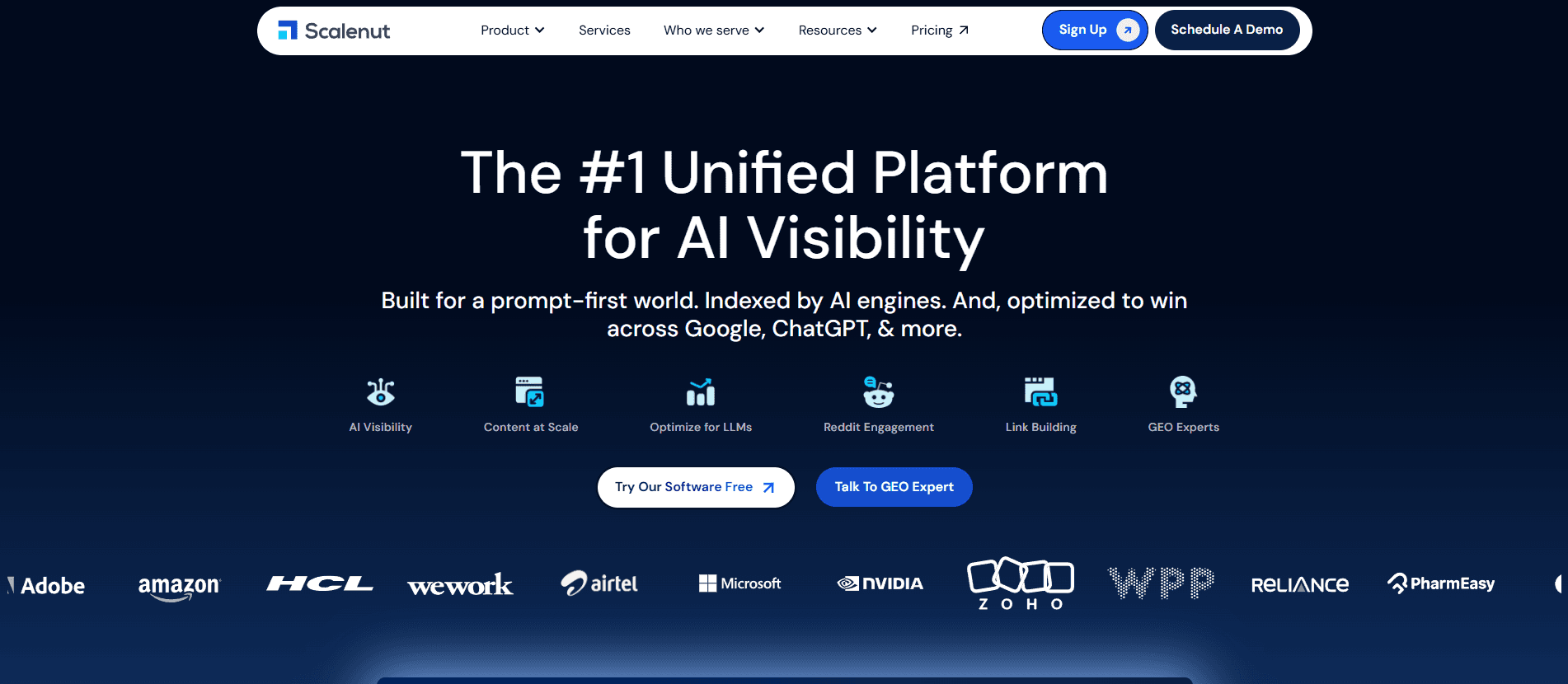
Scalenut positions itself as a full GEO platform. Its Cruise Mode writes AI-friendly blogs in minutes, while its GEO Watchtower tracks your visibility across AI engines. It also offers keyword clustering, audits, and link building marketplace tools.
Use case: A growing startup can plan content, create optimized articles quickly, and track AI mentions without juggling multiple tools. Especially useful for in-house teams with limited resources.
Pricing: Free trial and paid plans.
Pros:
Strong for SERP-inspired content
Cons:
Can feel limited for advanced technical SEO
Aiso
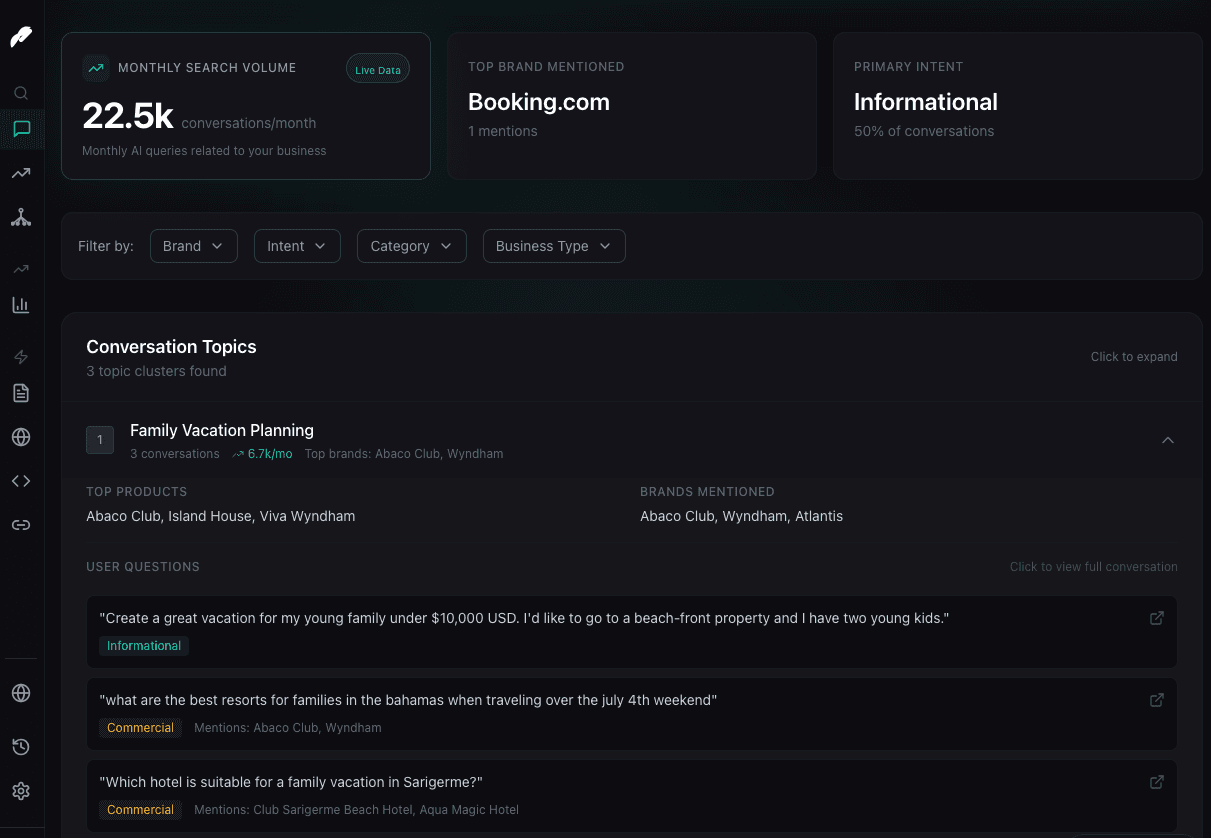
getaiso.com is acomprehensive AI visibility tool, offering 98% accuracy inChatGPT visibility tracking across multiple AI platforms. Built specifically for brands and agencies, Aiso combines real-time monitoring with actionable optimization recommendations.
Key Features:
98% citation accuracy rate
Real-time ChatGPT visibility tracking
2+ years of historical data
Advanced competitor analysis
Multi-platform AI visibility monitoring
API integration capabilities
Pricing starts from $70/month
Best For:
Brands and agencies wanting comprehensive AI visibility tracking with actionable insights and optimization recommendations.
Nightwatch

Nightwatch is a precision rank tracker. It supports classic engines (Google, Bing, YouTube) but also monitors visibility in ChatGPT, Claude, and Gemini. It can track down to the zip-code level and detect appearances in AI Overviews, featured snippets, and local packs.
Use case: Agencies needing detailed rank tracking can use Nightwatch to prove performance not just in Google SERPs but also in generative answers—something clients increasingly ask about.
Pricing: Paid starts at $32/month.
Pros:
Multiple engines, customizable reports
Cons:
More focused on tracking than optimization
Search Atlas

Search Atlas integrates OTTO AI, an assistant that automates audits, fixes technical issues, creates content, manages Google Ads, and even optimizes Google Business Profiles. It’s one of the most automation-heavy platforms available.
Use case: Agencies can scale technical SEO and content generation by letting OTTO handle audits, fix schema issues, and push recommendations live, freeing human SEOs to focus on strategy.
Pricing: Custom plans.
Pros:
Agency-friendly, lots of automation
Cons:
Higher cost, best for agencies
Mangools AI Search Grader

Mangools launched AI Search Grader, a free tool that checks your brand’s visibility across eight AI engines, including ChatGPT, Gemini, and Perplexity. It gives you a visibility score and compares your performance against competitors.
Use case: A quick, no-cost way to see if your brand is showing up in AI answers before investing in paid platforms.
Pricing: Free.
Pros:
Good starter for AI visibility
Cons:
Not designed for deep content work
Alli AI

Alli AI focuses on technical automation. Its Live Editor makes SEO changes directly inside your CMS without developer help, while its AI Schema and Internal Linking modules handle optimization at scale. The new AI Search Visibility Engine ensures that AI crawlers like ChatGPT and Claude can actually read your content by serving static HTML.
Use case: Perfect for teams running large or complex sites (React, Vue, Angular) where AI crawlers struggle. Alli AI makes sure your content is accessible and technically optimized.
Pricing: Starts ~$99/month.
Pros:
Strong tech SEO automation
Cons:
Narrow focus, not a content tool
Rank Prompt
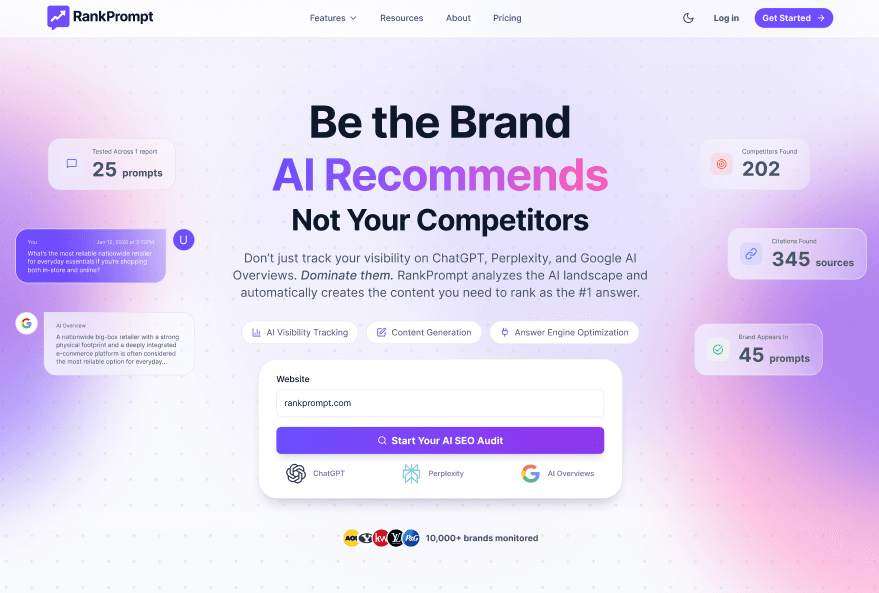
Rank Prompt is an AI visibility and Answer Engine Optimization (AEO) platform designed to help brands understand how they appear inside AI-generated answers across tools like ChatGPT, Gemini, Perplexity, and Google AI Overviews. Instead of relying on traditional keyword rankings, RankPrompt evaluates real, user-style prompts to determine whether a brand is mentioned, how prominently it appears, which competitors are cited, and which sources influence those responses.
Technical Specifications
AI platform coverage: Tracks brand visibility across ChatGPT, Gemini, Perplexity, and other AI-driven search and assistant experiences.
Prompt-based reporting: Measures brand mentions, competitive presence, and visibility trends across scheduled and historical prompt runs.
One-click multi-location tracking: Designed for franchises and multi-location businesses, RankPrompt allows teams to track AI visibility across multiple regions or countries with a single configuration. The same prompt set is automatically applied to each location, enabling fast, side-by-side comparisons of how different branches appear in AI-generated answers.
Content generation & publishing: Includes a trained content generation agent that converts AI visibility gaps and missed prompts into publish-ready articles. RankPrompt integrates directly with WordPress, allowing teams to draft, edit, and publish content based on real AI prompt data without leaving the platform.
White-label exports: Generate branded PDF reports combining AI visibility, SEO data, analytics, and citation insights for client-facing use.
Analytics & SEO integrations: Connects with Google Analytics and Google Search Console, and includes technical SEO audits, content analysis, and on-page diagnostics.
Citation intelligence: Enriched citation data surfaces the sources influencing AI answers, including metadata and preview details for referenced pages.
Collaboration & reporting: Supports collaborators, dashboards, quick reports, and scheduled monitoring for ongoing visibility tracking.
Pricing
RankPrompt offers tiered pricing based on usage credits and feature access, with plans starting at approximately $49/month. Higher-tier Pro and Agency plans include additional credits, multi-brand management, collaboration features, and white-label reporting.
Reviews & Market Reception
RankPrompt is listed on G2, where it currently holds a 4.3 out of 5 rating based on early user reviews. Reviewers highlight the platform’s prompt-based tracking approach, clarity into why brands do or do not appear in AI answers, and the ability to connect AI visibility insights directly to content and citation strategy.
Google Search Console & Planner
Even in the AI era, the basics matter. Google Search Console remains critical for measuring impressions, clicks, indexing, and site health. Keyword Planner (via Google Ads) still provides reliable keyword volume, competition, and CPC data.
Use case: Use GSC to monitor technical issues and performance, while Keyword Planner validates the demand behind new content ideas. These remain the non-negotiable foundations of SEO.
Pricing: Free.
Pros:
First-party data, always useful
Cons:
No AI content creation, visibility tracking
What Makes a Good AI SEO Tool?
Before you pick, set your goals. Do you want to create content faster? Track visibility in AI search engines? Run technical audits? Not every tool does it all. For context, agencies often need white-label platforms and scalable features. Brands and e-commerce stores may care more about reporting and integrations with their CMS. Here are my must-haves:
E-E-A-T alignment: Can the tool help create trustworthy, authoritative content? Does it support clear authorship, citations, and brand consistency?
Integration options: Look for tools that connect to WordPress, Google Search Console, APIs, or your favorite workflow.
Scalability: Big sites and agencies need batch processing and clear reporting.
White-label features: Handy for agencies serving different clients.
AI search tracking: Does it measure your presence in LLM answers and AI Overviews? This is non-negotiable now.
How to Choose the Right AI Tools for SEO
Prioritize tools that help the page achieve its purpose (for you: visibility + growth). Look for:
AI search tracking (non-negotiable in 2026).
Keyword research tools with clustering and keyword difficulty.
Technical SEO (site audits, internal links, schema).
Content editor & content optimization for on-page wins.
Integrations (CMS, GSC, GA), scalability, and clear pricing plans.
Providing clear, specific, and accurate guidance improves MC quality and user satisfaction.
Read more: How to choose the right AI Search tool
My Experience on Using AI SEO Tools Effectively
Even the smartest tool is only as good as the person using it. Here’s what I recommend:
Use automation for ideation, clustering, and technical checks.
Always fact-check and add personal insights. AI outputs can miss nuance.
Align everything with E-E-A-T principles - clear author, first-hand experience, strong references.
Regularly update and audit your content. In our company, we schedule monthly AI Visibility Audits and cross-check results with GA4.
Pair tools and keep learning; SEO in 2026 changes every few months.
Conclusion & Next Steps
AI SEO tools are now indispensable for getting noticed both in Google and inside AI chat engines. The most important step? Pick software that supports your real strategy. Does it track visibility, improve E-E-A-T, and integrate with your tech stack? That’s what counts most.
Start with AIclicks if you care about AI future-proofing. Test a few others, compare results, and keep monitoring as the landscape shifts. The deeper your understanding, the better your results—and the more visible your brand will be, no matter where users are searching.
Looking for more? I recommend running an AI Visibility Audit now - you’ll know exactly where your brand stands and what to do next. Good luck.
FAQs on AI SEO Tools 2026
Does SEO still matter in 2026?
Yes—SEO is vital but changing. We now focus on user intent and platform-specific content. Blending SEO with social, email, and AI is key.
How is AI changing SEO in 2026?
AI favors deeper, human-like answers, not just keyword matches. Tools help automate content, audit sites, and track visibility in chatbots and AI Overviews.
What is the future of SEO with AI?
Expect more zero-click searches and direct answers. Your brand needs high-quality, structured, and topical authority to get featured. AI tools will help automate, personalize, and predict trends.
How to do SEO in 2026?
Focus on user needs, quality content, and authority. Master technical SEO, optimize for AI engines, diversify content formats, and use strong data tools.
How to do SEO for ChatGPT?
Rank first on Google and Bing, then optimize content to be AI-friendly. Gather brand mentions from external sources Use ChatGPT to brainstorm keywords and create content, but always add expert touches and improve structure. We have a dedicated blog post for that --> How to appear in ChatGPT results
Our Content:
Guide
How to Use Perplexity AI (Like a Pro) in 2026
Feb 12, 2026
Guide
How to Get Backlinks to Your Site in 2026
Feb 12, 2026
Tools
8 Best AI Search Engines in 2026
Feb 12, 2026
Tools
9 Best LLM SEO Tools for 2026 (and how to pick the right one)
Feb 12, 2026
Tools
10 Best LLM Optimization Tools in 2026
Feb 12, 2026
Tools
9 Best tools for tracking LLM visibility in 2026
Feb 12, 2026
Any questions left?
Book a call here:




